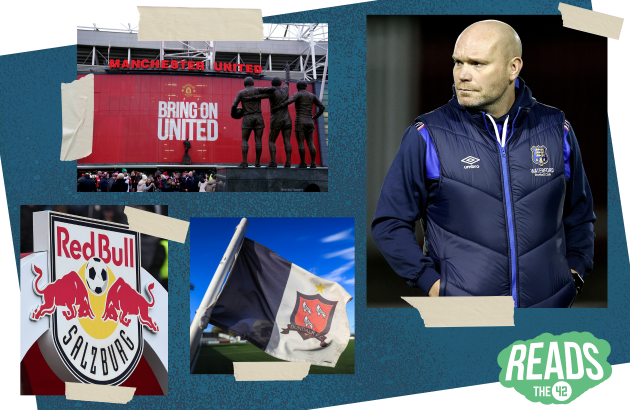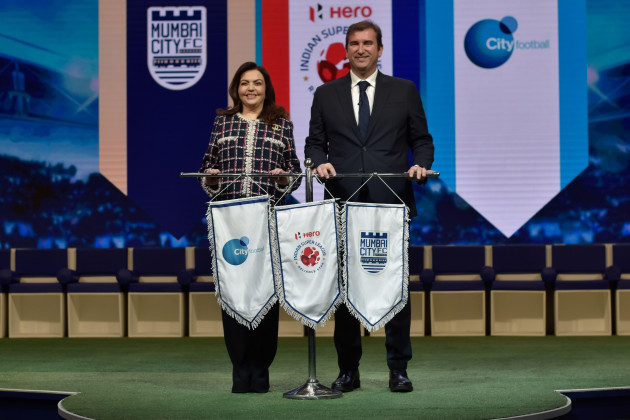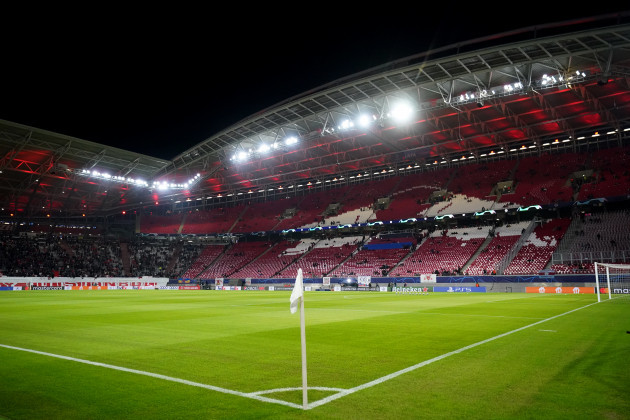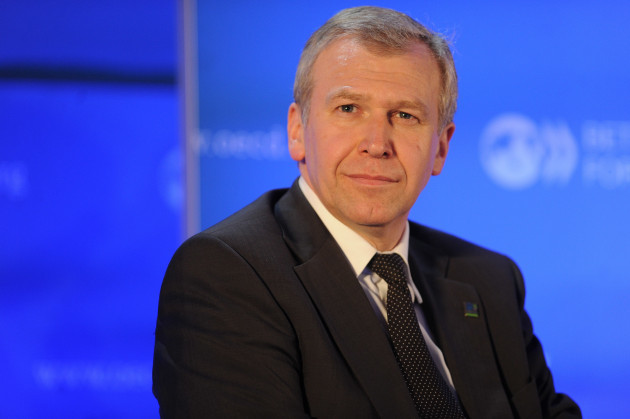“I CAN’T BELIEVE I am writing this”, began Waterford’s tweet last month.
“The match in Dubai – yes Dubai – between Waterford FC and Fleetwood United has been abandoned due to a waterlogged pitch.”
That said, finding rain in the desert was about as improbable as finding a League of Ireland First Division side out there on a pre-season training camp.
“If we didn’t have a club in Dubai as part of the family, we wouldn’t have been in Dubai”, Waterford manager Danny Searle tells The42.
The family to which Searle refers is the network of clubs owned by English businessman Andy Pilley. He completed a takeover of Waterford last year, and is already the owner and chairman of Fleetwood Town in England’s League One. Pilley has also established clubs in Dubai (Fleetwood United) and South Africa (Western Cape Fleetwood), along with a separate junior club, United FC of Dubai.
All of the clubs have a relationship with Fleetwood Town’s International Football Academy, which recruits players from across the world to train alongside Fleetwood Town’s first-team.
The benefits for Waterford go beyond a trip to Dubai, the most obvious of them is access to players. While Waterford’s star player of last year, Phoenix Patterson, has moved to Fleetwood Town in England, a trio of players have gone the opposite direction and joined Waterford on loan. Meanwhile, having been forced to leave Waterford due to visa issues, midfielder Junior Quitirna was moved to Fleetwood Town, who have in turn loaned him to Altrincham for some regular game-time. Once the visa matter is resolved, he is expected to return to Waterford.
The multi-club network also allows for the sharing of ideas, with all of the respective managers and coaches in a WhatsApp group together. The model has given Waterford huge advantages in the race for promotion this year, but Searle says it works both ways.
“If we are realistic, they [Fleetwood Town] wouldn’t have done it if there wasn’t a benefit in the bigger picture”, says Searle.
“When the relationship first developed there were question marks as to how it would develop. Is it going to just be Fleetwood Town taking players? Andy [Pilley] wants to win the league, and he wants to get into Europe. That doesn’t work if you strip the club of its assets. The investment we have put into the squad is a clear sign it’s not all about Fleetwood Town, it’s about the bigger picture and that is ultimately about Waterford being a European club.”
While Waterford have been brought into Fleetwood’s orbit, Southampton owners Sport Republic explored an investment in Shelbourne last year that did not ultimately come to fruition. Shelbourne remain open to investment as do Dundalk, and both have caught the attention of Hull City’s Turkish owner Acun Ilicali. Having been heavily linked with a takeover of Dundalk, Ilicli was sitting alongside Shelbourne chairman Andrew Doyle at Shels’ game against St Patrick’s Athletic on Friday.
Both Irish clubs are seeking investment to remain competitive on the pitch while developing their facilities, while Ilicali has previously set out his ambitions.
“My idea is actually to buy another team that can help us to improve our young talents”, he told a Hull fans forum in Turkey last year.
But the growing prevalence of multi-club ownership is by no means singular to Irish football.
**********
More than 180 teams across the world were part of a multi-club group at the end of last year, which is a rise of more than 400% in the space of 10 years.
Myriad reasons underpin this rise. Some groups see multi-club networks as strong branding opportunities, most obviously evident with the Red Bull group, who own high-profile clubs in Leipzig, Salzburg, and New York, along with another club in Brazil.
Others have spied soft power, and the Abu-Dhabi-founded City Football Group have clubs in 12 countries across the world, the most famous of which is Manchester City.
For others, the motivations are more similar to that of Pilley and Fleetwood: charting another route to success.
“A lot of groups do it for different motivations and different reasons”, says Jordan Gardner, who is a consultant with sports intelligence firm Twenty First Group and a former board member of Dundalk.
“The numbers we are seeing now for player sales are so exorbitant, people say, ‘Well if I could own my own club in Portugal then I can find the next Enzo Fernandez myself and I don’t have to pay €120 million for him.’”
There are other motivating factors too. Diversifying across a portfolio of clubs makes the relegation of one of those clubs easier to take, while Gardner says he is aware of a number of American investors who believe the sport is undervalued and thus are eager to exploit as many opportunities as they can.
And as with virtually everything else, Brexit is an added factor in the UK. British clubs can no longer sign EU-based players until they turn 18, while players over 18 must qualify under a points-based work permit system.
“Brexit is forcing these clubs in the UK to say, ‘Hey it’s not as easy to get in players outside the UK, how can we get landing spots for the players at another club’”, says Gardner. “So that’s encouraging multi-club almost out of necessity.”
Half of the teams in the Premier League now have a direct link with at least one other club in Europe, many of which are in Belgium. Don’t expect it stop there. Aston Villa this month announced plans to invest in Portuguese club, Vitória Sport Clube, while Gardner expects Chelsea owner Todd Boehly to add another club to his portfolio within the next year.
The preponderance on clubs in Portugal and Belgium is not an accident. It is partly because both countries have a very strong track record in the development of elite footballers but also because of other practicalities. Portugal provides a gateway to European football for Brazilian players – transfers from Brazil to Portugal have been the most common in the sport for the last four years running – while it’s significantly cheaper to bet on non-EU talent in Belgium, where the minimum wage is just a third of the average players’ wage in the top flight. (For comparison, the minimum in the Netherlands is one-and-a-half times the average top-flight wage.)
The theoretical benefits of multi-club models don’t always translate into success in reality, mind.
“It is very difficult to run a football club, and I think multi-club makes things exponentially more difficult”, says Gardner. “You take one club and multiply it by three or four while working in different countries with different languages, different cultures and different ways of doing business. It can be very challenging.
“The reality sets in that, ‘Wow, if we have three clubs in three countries, we are running a multi-national corporation now.’ How does that work? How do you deal with the club whose fans are protesting as they don’t want to be treated as a feeder club? And how do you deal with the club in another country where none of our staff speak their language? There are so many intricacies that are overlooked by groups who jump into it.”
The multi-club model also formalises a reality most football fans prefer to ignore: the food chain.
“I definitely think you’re seeing it become more of an issue”, says Gardner.
“Let’s be realistic: at the end of the day, every club is a feeder club – to Chelsea at the moment. What’s the difference between your club selling players to Chelsea and moving players to a club in your own portfolio? There isn’t. It’s just about articulating your strategy and your motivations, so people don’t think, ‘Hey this is an American group coming in, they don’t care about results and are just going to raid the roster.’
“Some groups have a challenge in articulating the right message and understanding the sensitivities. One example is [American businessman] David Blitzer’s group. They bought Brondby three months ago and fans are protesting, as they don’t want to be seen as a feeder club and that is for good reason: Brondby are a huge club.”
But where these are some of the issues multi-club ownership can raise for the clubs and owners involved, European governing body Uefa this month flagged a greater problem for the sport at large.
**********
“The rise of multi-club investment has the potential to pose a material threat to the integrity of European club competitions, with a growing risk of seeing two clubs with the same owner or investor facing each other on the pitch”, wrote Uefa in a recent benchmarking report, assessing the state of football across the continent.
Days later that same issue came to global attention with the confirmation of the two contenders to buy Manchester United. Jim Ratcliffe’s ownership of French club Nice and FC Lausanne-Sport of Switzerland is well-established, while Sheikh Jassim bin Hamad Al Thani’s links to the Qatari state and thus Paris Saint-Germain are less clear-cut.
The Court of Arbitration for Sport (CAS) set the tone for these issues back in 1999, when Slavia Prague and AEK Athens were controlled by Joe Lewis’ ENIC, now the owner of Tottenham. When both Slavia and AEK qualified for the 98/99 Uefa Cup, Uefa ruled that the lower-ranked AEK would not be allowed to play in the competition given a potential conflict with Slavia. CAS ultimately sided with Uefa, pointing out the potential for collusion if both were drawn in the same group together.
“This can happen with single owned clubs as well as with commonly owned clubs, but the multi-club owner or executive has additional ways of facilitating an (already easy) unspoken understanding between the teams, for example setting bonuses for drawing higher than, or even equal to, bonuses for winning the match”, read part of the CAS judgement.
Today, Uefa’s rules forbid any club from having “direct influence” on another club in their competitions, and these rules were most notably put to the test when Red Bull-owned clubs Leipzig and Salzburg both qualified for the Champions League for the 2017/18 season.
The clubs’ close links were distilled a year earlier, when Salzburg defender Andreas Ulmer accidentally wore a Leipzig shirt during the second half of a Champions League qualification match against FK Liepaja.
Initially Uefa recommended that Leipzig be forbidden from participation as they found Red Bull had a decisive influence at both clubs, but the decision was reversed when it reached Uefa’s adjudication stage.
Prior to that adjudication, Salzburg and Leipzig ripped up a co-operation agreement between the clubs, while Salzburg made a few operational changes which included their Red Bull-linked chairman stepping down and the reduction of sponsorship payments from Red Bull. Salzburg also promised to overhaul some of their branding – they have since tweaked their crest – and at that point Uefa ruled that Red Bull’s link with Salzburg was not as owners but instead a “a standard sponsorship relationship” and green-lit both clubs’ participation in the Champions League.
Yves Leterme was the Prime Minister of Belgium before becoming the Chief Investigator of Uefa’s Club Financial Control Body, and was involved in the hearing of the Leipzig/Salzburg case, and says the decision was partly a function of Uefa’s need to balance sporting interests with European Union legislation.
“To fully understand the logic of the decision-making and the ruling”, Leterme tells The42, ”one should know that FFP is an issue of navigating between the interests of the game – Uefa have to look after the integrity of the game – and European competition law legislation, where you have to allow for the fundamental freedoms of the European Union’s internal market.
“On Salzburg and Leipzig, you are limited in what you can do. What we did was to try and make a distinction between the boards, the owner, the sponsor, and the club. I think until now it has worked quite well. We agreed there would not be too many mid-season [player] exchanges, and they would not merge their training centres.
“It is not a major element but you have to take into account the free movement of persons and goods and services. You must keep in mind that clubs can go to the European court or European Commission and file a complaint against a behaviour or regulation of an organisation like Uefa.”
Going to a European court to complain about Uefa is precisely what the vestigial backers of the European Super League have done, using European competition law to argue that Uefa are acting as a monopoly in penalising them for seeking to form their own competition. The preliminary judgement ruled in favour of Uefa and the final judgement is expected later this year, and it will be interesting to see whether the outcome will have the knock-on effect of giving Uefa more regulatory teeth on a range of separate issues, including on multi-club ownership.
Leterme is no longer involved with Uefa, but has formerly worked as their Chief Financial Fair Play (FFP) investigator. Multi-club ownership, he says, can potentially make it easier for clubs to circumvent FFP rules.
“If you have a strict rule and you are close to coming in conflict with the rules in terms of balancing the books to break even, and if you own a club in Poland or Scandanavia or elsewhere which still has some space [on its books], you could very easily send a player there and then buy him back to make an accounting construction that allows you circumvent the rule. It would not be acting against it, and you could more do it more easily if you are the owner of different clubs. I think that is a fact of reality.”
**********
As more and more clubs are consolidated into the same ownership group, the potential conflicts of multi-club ownership will become a significant part of the conversation and debate around the sport at a European and global level.
But for clubs dotted across the world, becoming part of a multi-club network offers them the opportunity to compete in a ferocious environment. Shelbourne manager Damien Duff this month lamented that the mooted Sport Republic investment would have quadrupled his budget, while Waterford look set to reap the benefits of their place in the Fleetwood universe.
Speaking more broadly and away from the dry, regulatory texts of Switzerland and Strasbourg, Leterme has another concern for the smaller clubs sucked into these multi-club orbits.
“It can add a lot to the competitiveness of a club but whether the club remains rooted in the local community, that is more of a challenge. I think a club’s rooting in the local community should be guaranteed.”





